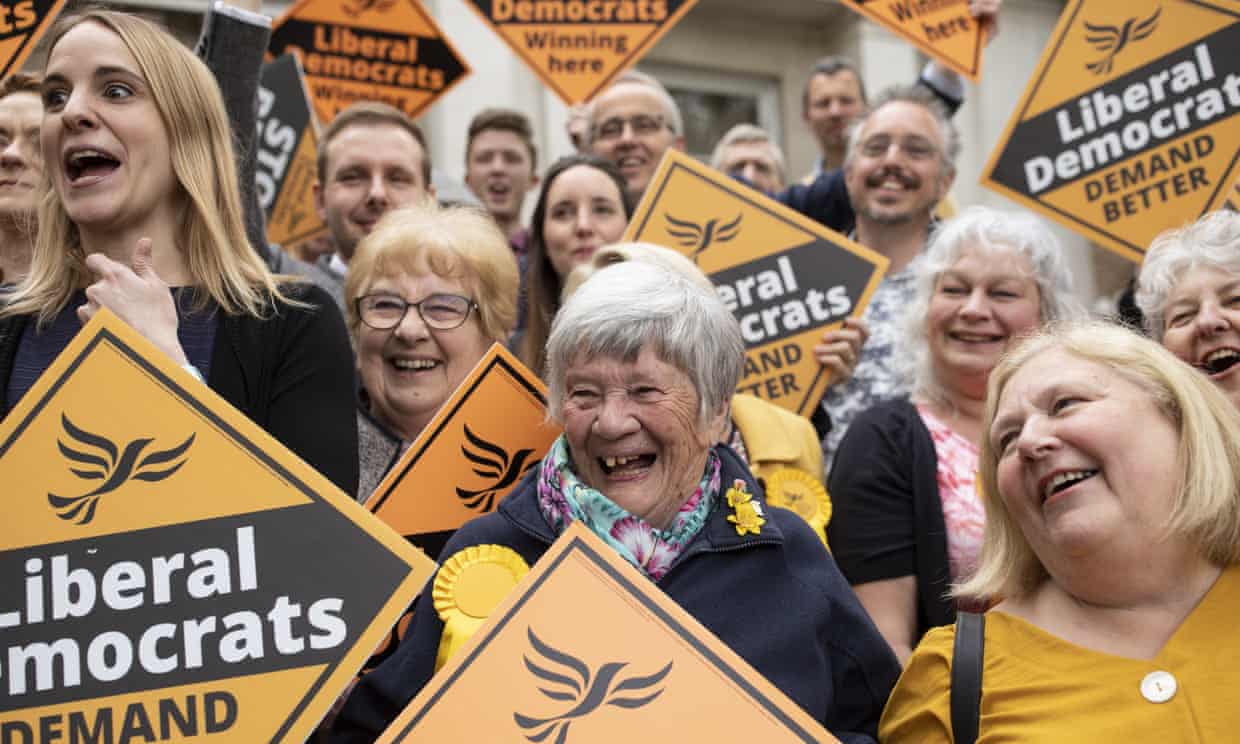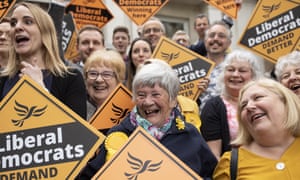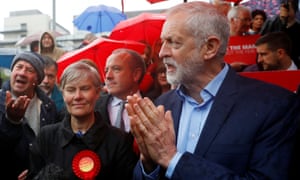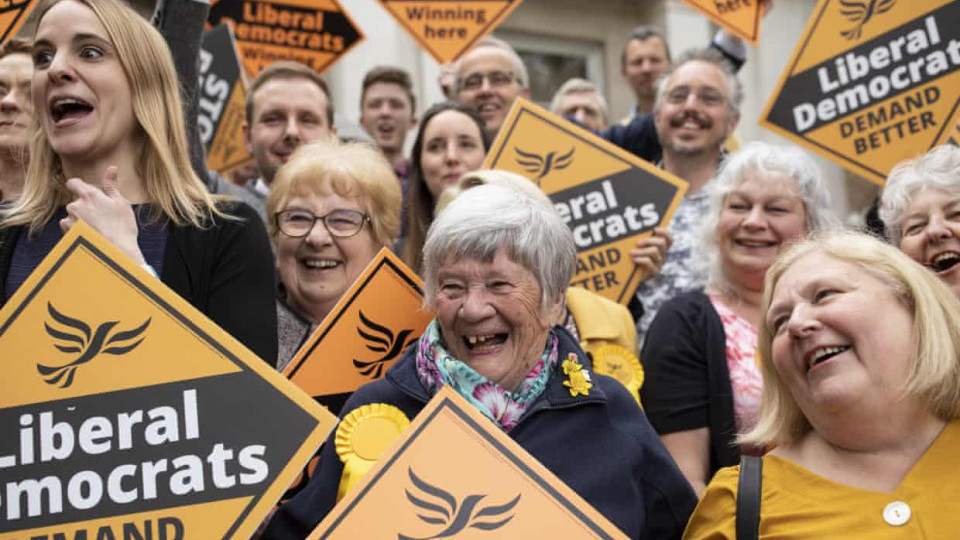

British politics was designed to be idiot-proof. It had some simple rules that anyone could follow. One of the most basic of those rules was the law of the seesaw. When one of the major parties plunged, the other soared. A terrible day for the Tories would be a triumphant day for Labour and vice versa.
This previously reliable rule is one of the many that has been unravelled by Brexit. It is now possible for both the major parties and their leaders to be in crisis at the same time. It is also possible for neither party to be able to agree how to extract themselves from their respective emergencies. The latest evidence of this is provided by the local elections and the conflicting responses of both Tories and Labour people to results that were harrowing for each.
You can assign different weights to the complex factors in play during these contests at the risk of getting lost in thickets of analysis. Keep an eye on the big picture and there is one simple and inescapable message: Britain is repelled by both the parties that have dominated its politics for the past century or so. Wherever there was a viable alternative to the two ugly sisters, they got pummelled. When all the results were in, the Tories and Labour wound up with a projected national vote share of just 28% each, their worst combined score for many a year.
This re-establishes a long-term trend of voter revolt against the blue-red duopoly that has dominated British politics since 1945. I have been suggesting for some time that the rise in their combined share at the last general election was the product of freak circumstances and a false positive for the big two. That looks even more the case today. Multi-party politics is alive and kicking. The fragmentation of voter allegiances continues. Neither the red tribe nor the blue clan is exhibiting a capacity to get anywhere near to speaking for a majority of Britons.
The main beneficiary in these elections were the Lib Dems, up by more than 700 seats. They were due a revival after the savaging inflicted on their local government base during their time in office with the Tories. Voter memories of Lib-Dem participation in the coalition may be softening, perhaps in part because that period looks like an era of strong and stable government compared with the chaos that has been unleashed since. The Lib Dems are returning to their historical role, which is to outperform at a council level and offer a home for voters discontented with the big two. In many parts of the country, the Lib-Dem surge was augmented by its appeal to anti-Brexit voters as a party unequivocally in favour of a fresh referendum.

The Greens, the second biggest winners, also benefited from their clear opposition to Brexit. It is reasonable to suggest that the Greens may have enjoyed a further boost from the additional salience given to their central cause by Extinction Rebellion. Anger towards the reds and the blues was further reflected in victories for many independents, more than 600 of whom won seats.
There is a sliver of consolation in this for the Tories. As the governing party, and one that has been in office for nine austerity-dominated years, the Tories should not expect to be liked. Given the multitude of reasons they have supplied for the public to turn against them, the Tories should expect to be loathed. Their leader is a self-lamed duck who even gets barracked by a tweedy heckler at one of her own party conferences. Many of the big donors to the Conservative party are on strike. So are many of their shrivelled band of activists. Less than 24 hours before the polls opened, Gavin Williamsonbecame the first cabinet minister in decades to be sacked for leaking confidential deliberations within government, ensuring that yet another example of Tory infighting and mayhem was in voters’ minds as they filled in their ballots. The former defence secretary prolonged that furore into voting day itself by noisily protesting that he is the victim of a miscarriage of justice. He even staked his children’s life on his innocence, though not, you may have noted, his own life or that of his pet spider.
The Tory loss of around 1,300 council seats is atrocious and at the same time not in the least surprising. Given that its own members describe this government as a “shitshow”, it is astonishing that anyone was willing to lend them a vote. The greater shocker is Labour’s performance, which was much worse than either the professional psephologists or the party’s own strategists had been forecasting. It is scant comfort for Labour that the party lost far fewer seats than the Tories and mitigated some of its council defeats by picking up gains here and there. The principal party of opposition should be winning at local elections and winning large at this stage of the electoral cycle. Yet Labour is failing to harvest the political bounty we would normally expect for the principal opposition when the government is so poisonously divided and visibly anarchic. Labour managed to turn in a performance that went backwards on its poor showing in 2015 when these seats were last contested. For the party to be confident of winning the general election it keeps calling for, it has to be doing much, much better than this.

In times past, such a dismal showing by the principal party of opposition would trigger a debate about the future of its leader. His personal ratings are historically dire and some Labour campaigners have publicly reported that Jeremy Corbyn was an issue on the doorstep, but the thought that he might be a large component of the problem remains a taboo topic for most of the party. So Labour people have tried to muster some alternative explanations for this failure. One is that the party’s more popular messages about domestic issues have been drowned out by the never-ending pyschodramas of Brexit. There is something in that, but a more skilful opposition would spend less time moaning about the climate and more energy trying to change the weather. Another excuse offered by Labour spokespeople is that the party is suffering from a general mood of “a plague on both your houses” among voters who are sick of Westminster politicking in general and the rat’s maze of Brexit in particular. This sounds true. If it is, this is a serious problem for the party. It was supposed to be one of Mr Corbyn’s great virtues that the career rebel could capture and channel “anti-establishment” feeling to Labour’s benefit. He arguably did that, especially among younger voters, at the 2017 election.
It is hard to escape the conclusion that Labour is paying a punishing price for its leader’s ducking and diving over Brexit. Labour’s endless weaving and swerving, designed to avoid alienating either leave or remain supporters by facing both ways, is now repelling both. This has not just made Mr Corbyn look unprincipled and equivocal on the greatest question facing the nation, it has damaged him more generally by exposing the Labour leader as no different to any other machinating, slippery, cynical politician.
Both he and Theresa May have an incentive to try to find a way through the Brexit impasse and resolve what is a nightmare for both parties. She needs a fix in order to be able to depart Number 10 with some shreds of dignity and before her party throws her out. He needs a fix because Brexit is becoming as damaging to Labour as it is to the Tories. So both have reacted to these results in the same way, by saying that they show the country wants to “move on”. Acolytes of the two leaders insist that they will intensify the effort to bring the cross-party talks to a conclusion.
Yet it is hard to see any kind of deal between the two party leaderships that would “sort” Brexit in a way that commanded the consent of their members, their parliamentary parties or a majority of voters. The Tory party will explode if there is a compromise that leans into Mr Corbyn’s version of Brexit. Labour will detonate if its frontbench tries to enable Mrs May to deliver any kind of Brexit. Even if the two leaders can broker a bargain, it is hugely uncertain whether it could be got through the Commons and absolutely guaranteed to be enormously unpopular with vast swaths of voters on both sides of the argument.
Brexit is simply too big for these discredited and divided parties. It is too much for their epically unpopular leaders. It is too huge to be resolved by a Westminster “fix”.
The Guardian









Leave a comment